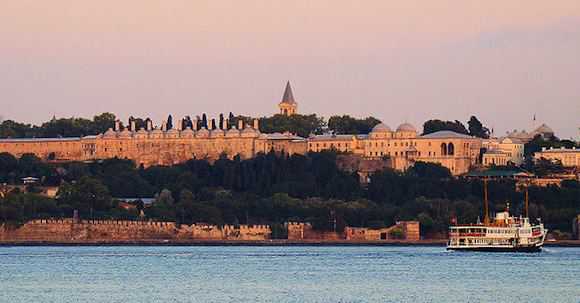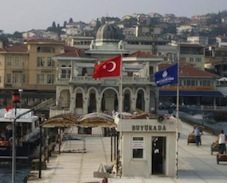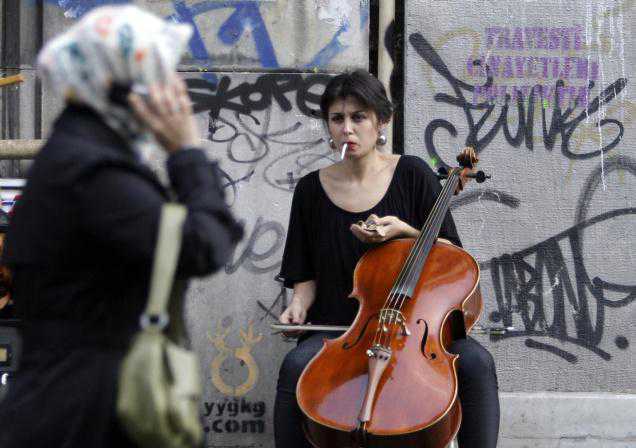Constantinople, Byzantion, Poli, Istanbul. These are the names that Greeks usually use to refer to the once capital of Byzantium and today’s largest city in Turkey. Istanbul is a multicultural, modern city, and an attractive tourist destination that offers everything from ancient history to fabulous nightclubs.
A tourist destination for many Greeks or admirer’s of Greek ancient history, Istanbul is home till this day to about 3,000 Greeks.
In 685 B.C., settlers from the ancient Greek town of Megara chose to colonize the town of Chalcedon, in today’s Kadıköy district. Some years later, in 667 B.C., famous Greek King Byzas went on colonizing the European side of the Bosporus further, thus founding the city of Byzantion.
As Today’s Zaman mentions, two prominent examples of ancient Greek architecture are the Serpentine Column and Leander’s Tower.
Approximately 2,500 years-old, the Serpentine Column is said to be İstanbul’s oldest remaining Greek monument. Erected to honor the triumph of the Greeks over the Persians at Plataea, it originally stood at Delphi and was moved to İstanbul in 324 B.C. by Constantine the Great to mark the declaration of the new capital city of the then-founded Roman Empire under the name of Constantinople.
Surrounded by no fewer stories is Leander’s Tower, often referred to as Maiden’s Tower and located offshore in the Bosporus in the Üsküdar district. It was actually built in 408 B.C. by an Athenian general to control Persian ships sailing along the Bosporus.
Although the Greek footprints exist around every corner of the city some major sights that have great Greek interest include Hagia Sophia (Αγια Σοφία), Topκapi, the Patriarchate and Saint George Church, Halki School and Princess Islands.
Agia Sophia
Hagia Sophia or Saint Sophia (from the Greek: Ἁγία Σοφία, “Holy Wisdom”) is a former Orthodox patriarchal basilica, later a mosque, and now a museum in Istanbul, Turkey. From the date of its dedication in 360 until 1453, it served as the Greek Patriarchal cathedral of Constantinople, except between 1204 and 1261, when it was converted to a Roman Catholic cathedral under the Latin Patriarch of Constantinople of the Western Crusader established Latin Empire. The building was a mosque from the 29th of May 1453 until 1931, when it was secularized. It was opened as a museum on the 1st of February 1935.
The Church was dedicated to the Logos, the second person of the Holy Trinity, its dedication feast taking place on 25 December, the anniversary of the incarnation of the Logos in Christ.
It was the largest cathedral in the world for nearly a thousand years, until Seville Cathedral was completed in 1520. The current building was originally constructed as a church between 532 and 537 on the orders of the Byzantine Emperor Justinian and was the third Church of the Holy Wisdom to occupy the site, the previous two having both been destroyed by rioters. It was designed by the Greek scientists Isidore of Miletus, a physicist, and Anthemius of Tralles, a mathematician.
Topkapi Palace
The palace complex is located on the Seraglio Point (Sarayburnu), a promontory overlooking the Golden Horn and the Sea of Marmara, with the Bosphorus in plain sight from many points of the palace. The site is hilly and one of the highest points close to the sea. Topkapi includes a lot of Greek treasures including ancient artifacts, books and unique architecture.
During Greek and Byzantine times, the acropolis of the ancient Greek city of Byzantion stood here. There is an underground Byzantine cistern, located in the Second Courtyard, which was used throughout Ottoman times, as well as remains of a small church, the so-called Palace Basilica on the acropolis have also been excavated in modern times. The nearby Church of Hagia Eirene, though located in the First Courtyard, is not considered a part of the old Byzantine acropolis.
The library is a beautiful example of Ottoman architecture of the 18th century. The exterior of the building is faced with marble. The library has the form of a Greek cross with a domed central hall and three rectangular bays. In 1928 the books of the Enderûn Library, among other works, were moved here as the Palace Library (Sarayı Kütüphanesi), housing a collection of about 13,500 Turkish, Arabic, Persian and Greek books and manuscripts, collected by the Ottomans. Located next to the mosque to the northeast is the Imperial Portraits Collection.
Patriarchate – Saint George Church
Constantinople has been the center of the Eastern Christian Church since Constantine moved the Roman capital there in the 4th century. To this day, the city remains the home of the Ecumenical Patriarch of Constantinople, who is recognized as the “first among equals” of all Orthodox spiritual leaders. The Patriarchate’s church is Saint George.
St. George
St. George had been part of a monastery before it welcomed the Orthodox Patriarchate. Over the centuries, it has been periodically damaged, the last time during the fire in 1941. Repairs began in 1989 and were completed in 1991.
The church’s main boast, aside from its association with the Patriarch, are its artifacts and relics, which include: the patriarchal throne, believed to date from the 5th century; three rare mosaic icons; the Column of Flagellation to which Jesus was tied and whipped; relics of Sts. Gregory the Theologian and John Chrysostom; and the tombs of three female saints.
The Patriarchate complex includes the Authorization Offices, the Patriarchate Library, the Financial offices, the public enterprises of Patriarchate and the Patriarchate Cathedral Church of Saint George.
Princess Islands
During the summer months the Princes’ Islands are popular destinations for day trips from Istanbul. In the past Princess Islands used to be home for thousands of Greeks but till this day there are a lot of Greeks living there. The largest island is Prinkipos where is also located the Orphanage of Saint George. As there is no traffic on the Islands, the only transport being horse and cart, they are incredibly peaceful compared with the city of Istanbul. They are just a short ferry ride from both the Asian (at Bostancı and also Kartal) and European sides (from Sirkeci/Eminönü, Kabataş and Yenikapı) of Istanbul. On the island of Halki there is the famous Greek Orthodox Theological School
Theological School of Halki
The Halki seminary, formally the Theological School of Halki (Greek: Θεολογική Σχολή Χάλκης), was founded on 1 October 1844 on the island of Halki (now called Heybeliada), the second-largest of the Princes’ Islands in the Sea of Marmara. It was the main school of theology of the Eastern Orthodox Church’s Ecumenical Patriarchate of Constantinople until the Turkish government stopped its use in 1971. The theological school is located at the top of the island’s Hill of Hope, on the site of the Byzantine-era Monastery of the Holy Trinity. The premises of the school continue to be maintained by the monastery and are used to host conferences. Visitors can see the school and wander around the campus. As of January 2011, an international campaign to reopen the theological school is entering its 40th year. Ecumenical Patriarch Bartholomew I of Constantinople is among the schools alumni.
How to get there:
Turkish Airlines offers many daily flights from Athens and Thessaloniki Airport. The award winning air carrier also offers international flights that connect most major international cities directly with Istanbul. New York, Los Angeles, London and Tokyo are only some of the cities that Turkish is flying directly. Turkish Airlines is flying in more than 200 destinations worldwide with an excellent fleet and unique services.Where to stay in Istanbul:
Armada Hotel, is one of the best hotels in the neighborhood of Sultanahmet, inside the walls of the old city. The Hotel is situated afew minutes away from the Blue Mosque and Agia Sophia. The hotel’s terrace often hosts wedding parties and offers breathtaking views of the old city, Bosphorus sea, Blue mosque and Agia Sophia.Where to eat: Near Istanbul’s Taksim square at the neighborhood of Pera, there is Krependeki Imroz, a family restaurant owned by Greeks. The restaurant offers great ‘meze’ dishes in a great environment.




